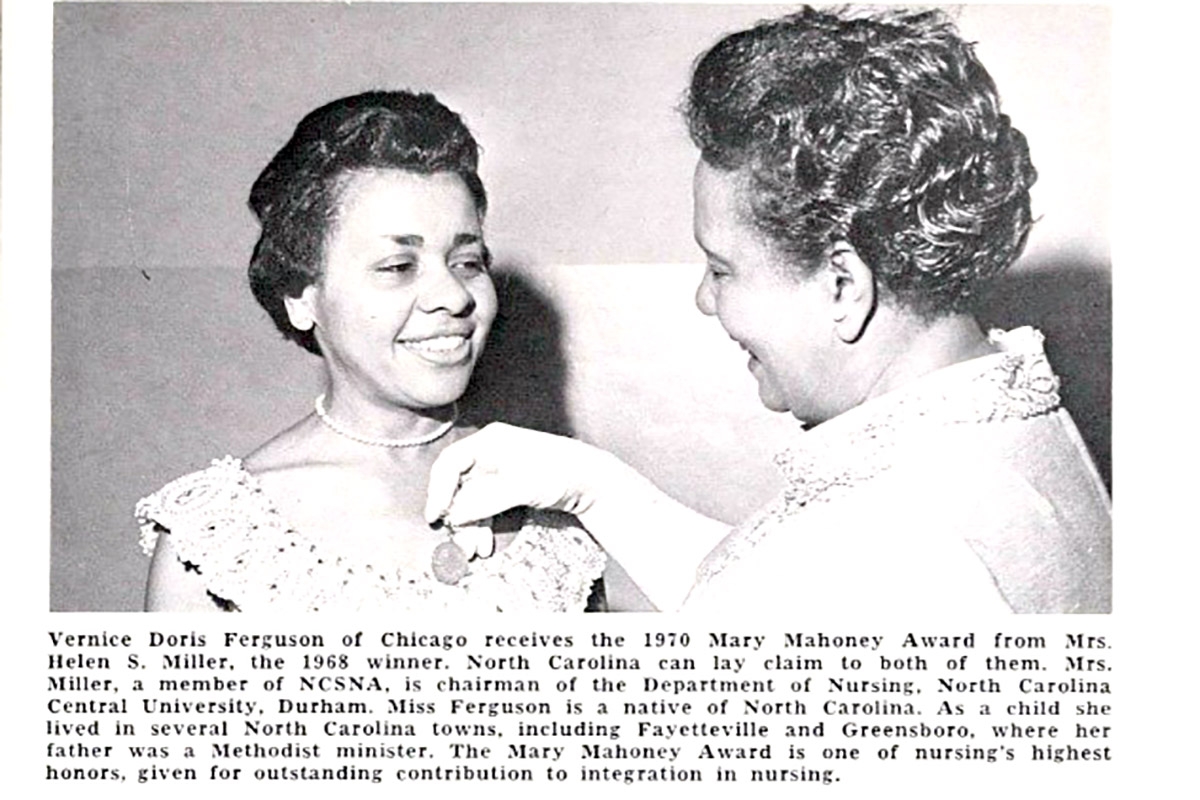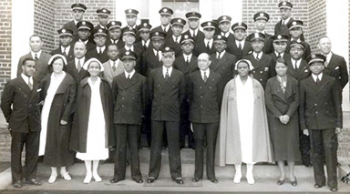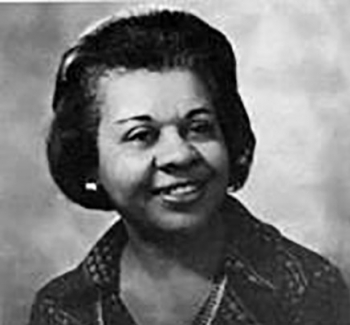When Vernice Ferguson became the first African American to lead the VA Nursing Service in 1980, she inherited the largest nursing service in the nation, overseeing 60,000 professionals. By comparison, only 60 years earlier, the first African American nurses were hired to care for Black Veteran patients at the Veterans Hospital in Tuskegee.
Her long and influential career as a teacher, innovator, leader and advocate for racial parity at VA is a remarkable legacy.
With the end of World War I and a growing number of African American Veterans, in 1923 Veterans Bureau Director General Frank T. Hines instituted the first African American hospital in Tuskegee, Alabama, staffed by the first African American hospital director and all-Black staff.
Under the leadership of Chief Nurse Esther Bullock, and after completing training in Greenville, South Carolina, Amelia Gears, Tresa Charles, Inithia Williamson and Ruth Garrett became the first “complete corps” of African American nurses at a VA hospital. Their appointment was not without controversy though, as the Ku Klux Klan threatened medical staff and staged multiple demonstrations outside the hospital.
President would not send troops to confront KKK
After an incident in July 1923, the National Association for the Advancement of Colored People (NAACP) requested that President Warren G. Harding send federal troops to address the situation, which was ultimately denied. Despite these challenging conditions, the nursing staff continued to care for African American Veterans at Tuskegee and the program grew in size and scope.
By 1945, a total of 109 Black nurses were caring for Black Veterans around the system of VA hospitals including at Fort Bayard, New Mexico; Kechogran, Virginia, Oteen, North Carolina, in addition to Tuskegee.
That year also saw major developments for African American nurses with their professional designation status within VA, resulting in higher pay and equal status with counterparts in the Armed Services. In 1946, the American Nursing Association (ANA) accepted for membership VA African American nurses who had been barred by state organizations.
School director refused to shake her hand
South Carolina-born Vernice Ferguson began her career in 1953, the same year that desegregation began throughout all VA hospitals. Ferguson had graduated in 1950 from New York University’s Bellevue Medical Center with a nursing degree. Despite having received an award for high scholastic standing, the school’s director of nursing refused to shake her hand.
Training as one of only 13 Black nurses at the Hines VA Hospital in Illinois, Ferguson quickly discovered that despite the strides and advancements made by African American nurses, their progress did not equate with white counterparts.
Reflecting on her earliest days at VA, she recalled, “There were 13 nurses of color at Hines and they lived in containment huts on the other side of campus while the white nurses lived in beautiful two-story Georgian buildings.”
Fought to get Black nurses equal housing
After completion of her training, Ferguson engaged in the battle to furnish Hines nurses with equal housing. It was one of many campaigns she undertook to challenge racism, for which she received the Mary Mahoney Award at the 1970 ANA Convention for “Outstanding contribution to integration in nursing.”
In addition to supporting nurses’ professional and educational development, Ferguson was deeply passionate about ensuring the mental and emotional health of nurses responsible for caring for Veterans.
In 1985, she took a sabbatical from VA to join the School of Nursing at The Catholic University of America to improve her knowledge of caring for older Veterans. She did it to set an example for other nurses and show, as a leader, that nurses could and should have access to the same learning opportunities as doctors. During the sabbatical, she wrote an article revealing feelings of “depression, fright, and hopelessness” in which she proposed mental health coping strategies for nurses.
Early caregiver advocate
Ferguson also publicly discussed her personal logistical and emotional challenges with accessing care for an aging mother. She advocated for “taking care of caregivers” and improving the lines of communication between nurses and leadership to ensure that nurses’ emotional and educational needs were met.
After retiring from VA, Ferguson continued to publish and was bestowed with many honors, including the ANA’s “Living Legends” award. She was the first nurse to win the FREDDIE Lifetime Achievement award in 2008, an equivalent to the Academy Awards for the health and medical professions.
Ferguson died on Dec. 8, 2012, at age 84, leaving behind a personal and professional legacy of equal access to services and care for nurses, Veterans and their caretakers and families.
Topics in this story
More Stories
Study underscores important role COVID vaccination can have in protecting Veterans from infection and reducing long-term health consequences
Columbia VA’s robotic surgery teams completed their 800th robotic surgery and are on schedule to hit 1,000 by the end of the year.
In a decentralized clinical trial, Veterans can participate from their own homes or local VA instead of having to travel to a research site.









I am amazed each year during Black History Month to hear more and more inspiring stories that people seem to share, ones I would have never known about. My thanks is to the VA VAntage Point for presenting these opportunities for more people to share stories of yesteryear that have made a tremendous impact and difference in the VA Healthcare system as we know it today.
Thank you for this story! Ms Ferguson is, indeed, an icon worthy of emulation. Thanks to her, and others like her, VA is a much better organization. She is proof that any obstacle can be overcome with the right dose of fortitude. May we never forget her name! May I have permission to repost this on my blog? Obviously, the credit will go to the authors, and to VA.
Wonderful article.
Now when will the thousands and thousands of women who enlisted in
THE CADET NURSE CORPS during WW 2 be recognized
as VETERANS
as the other uniformed services (Merchant Marine…) were.
It’s time our government at least springs for a little $2 flag
on their graves.
As a second generation VA nurse I watching my mother, Rosemary Baker, continuously passed over for promotions even though she was the preferred trainer for each new nurse assigned to her department……and this was as an LPN. She watched several new nurses she’d trained get promoted over her. Having her fill of such treatment, she filed a lawsuit against her VA (Tampa) for discrimination, and won!! While being away from the VA due to that lawsuit my mother used that time to get her RN degree. Following the completion of the lawsuit, she returned to the same VA as an RN and managed the first Community Based Outpatient Clinic (CBOC) in Polk County Florida.
Following in her footsteps by becoming a nurse, I too served as a VA Nurse. As a veteran of the Air Force, I found GREAT satisfaction in serving the veteran population. After reading the article about Vernice Ferguson, I am filled with that sense of pride that comes with knowing you are a part of something much bigger than yourself. Unfortunately, racism still exists in the VA, no matter how subtle, but to continue in one’s God given purpose requires strength and dedication. Thanks to strong Black women like Vernice Ferguson and my mom, women of color continue to dispel myths and untruths while paving the way for future nurses.
Thank you so much for this article.
VA: Why is black capitalized and white in lowercase? This is a really disgusting practice. We have honored *B*lack veterans and disdained *w*hite veterans: no prize for guessing which is the privileged category and which is disfavored.
“Training as one of only 13 Black nurses at the Hines VA Hospital in Illinois, Ferguson quickly discovered that despite the strides and advancements made by African American nurses, their progress did not equate with white counterparts.”
There is no excuse for this divisive, crude and insulting policy.
[Editor: We follow AP Style: https://apnews.com/article/archive-race-and-ethnicity-9105661462 ]
You should NOT follow the AP in this highly controversial, incendiary and politicized manner. The decision to deprecate White was made because of the personal political beliefs of the AP editors: basically that Whites *deserve* being lower-cased. You are not a private organization and you do not have the right to inject politics into your communications. You are legally required to treat Veterans equally regardless of our race or enthicity. There is a word for treating one race differently (poorly) because of its immutable characteristics…it’s right on the tip of my tongue.
Did Nurse Ferguson make the sacrifices she did so that a new second-class of citizens could emerge? Or did she work for ALL Veterans?
Even the White House, Washington Post and Wikipedia reject this obviously insulting and unfair practice. If it would be insulting to capitalize White and lower-case black, then it’s clear that the reverse is true. I look forward to your rectification of this regrettable usage,
Great article and enjoyed learning about nursing pioneers. I was a nurse at Hines and she really had her work cutout for her.
I still get shocked at reading what black people had to go thru back in the not so “good ol days” Amazing courage for this puoneer!
Thank you for sharing this amazing story, Ms. Ferguson was a true leader and her passion of caring made her a true nurse.
Thank you for sharing such a beautiful story of service, hope and history lived by Ms. Ferguson. We are a better VA Organization and Unites States of America because of the contributions and service of heroes like Vernice, despite the racism, segregation and adversity she and other Americans had to face and overcome.